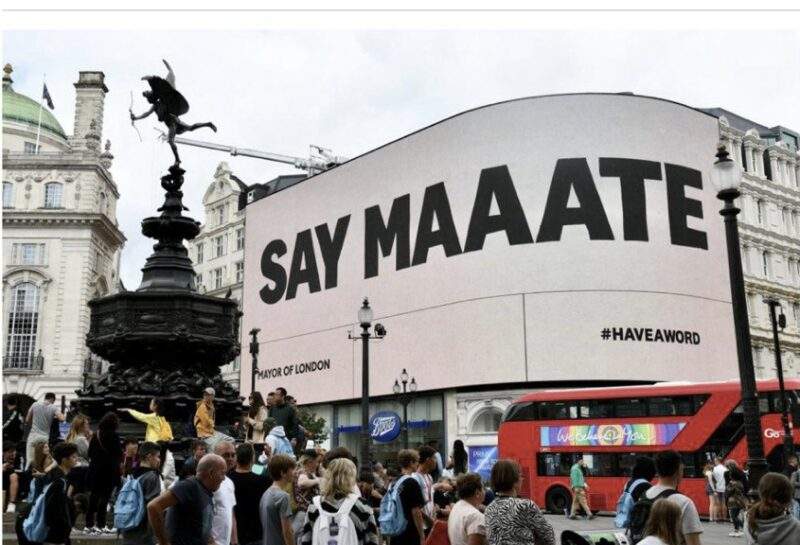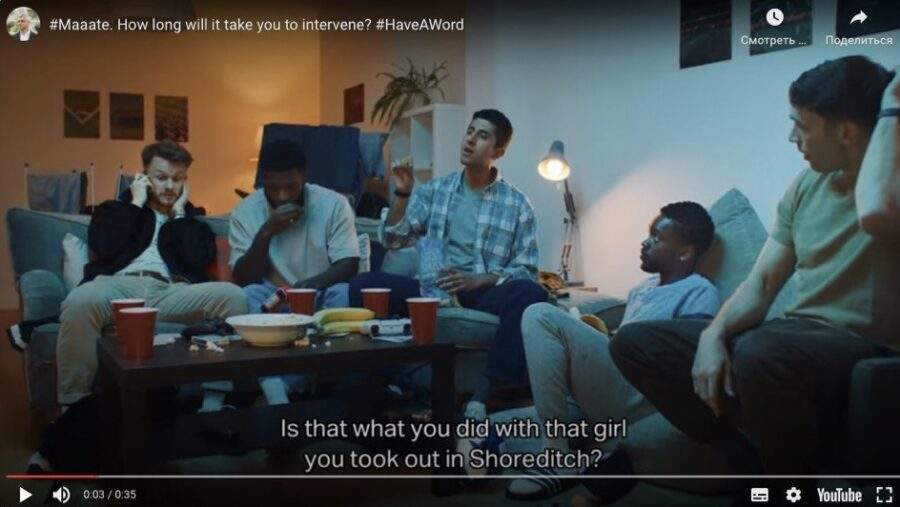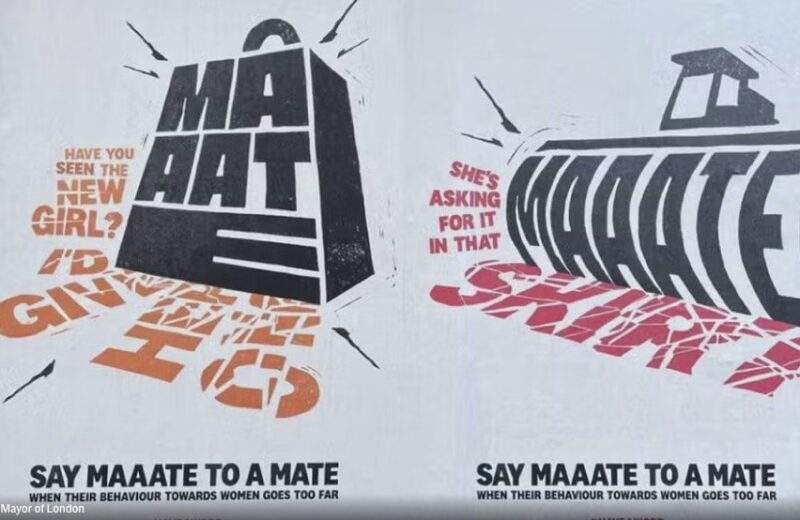1. The London Mayor’s “Say Maaate to a Mate” campaign
“An ugly war on human exchange”
On 21 July 2023 the London Mayor launched a new campaign empowering men to challenge misogyny by saying ‘maaate’ to their mates when they cross the line.
“The innovative campaign aims to help men and boys confidently step in when they witness language and behaviour towards women and girls that crosses the line. This is part of the Mayor’s refreshed strategy to tackle violence against women and girls (VAWG) that champions a public health approach, encouraging all of society to play their part and putting the onus of responsibility on men and boys to change the way they perceive, treat and talk about women.”

In the centre of London, in Piccadilly Square, a billboard featured the word “Maaate!” The idea to use the word as a show-stopper was also promoted by an interactive video. One guy, smirking, says something rude about a woman, and others try to stop him by saying “maaate!”. Those who watch the video can also stop the rude one, by a click.

The campaign was severely criticised: the video is offensively naïve and only features young men, as if there were no misogynists among older men; the “bad guy” looks like a working class – what, office lot all got angel nimbuses around their heads? Why the control of the banter is the priority task? Why the campaign does not tackle real problems: crime, violence, prostitution?
«The insights that drove the creative decisions after observing men in male-dominating places»
Before the Mayor of London launched the campaign, he commissioned a behavioural-science report, and Ogilvy consulting carried out research.
The research found that:
• Two in three men want to intervene when they hear misogynistic language, but did not know what to say.
• Research showed us that shaming people is not an effective strategy. For a mate to call out a mate, the most effective way to do it is from a place of respect for the friendship.
• More than half of men said that they would not know how to intervene in a risky situation.
The Mayor’s website also stated, right after the campaign began, the following:
61 per cent of men aged 18 – 34 in London said that they felt more confident in calling out sexist and misogynistic language after they had watched the video.
I wish I could meet at least a couple of men who had changed their behaviour.
Whether consultants could urge the mayor to look at behavioural issues at a different angle remains an open question.
Maybe they have already responded to the criticism, saying they were fulfilling the task at hand, “just did their job.”
Visibility
As a consultant, I feel envious about the visibility and the discussions sparked by the campaign, by the project – on control, hypocrisy and so-called new rules of conduct which seem to eliminate human contact from communication.
To me, the visuals seem a bit awkward but the idea is good.
Below, I quote some articles.
Article Clips
Melanie McDonagh, The Evening Standard, 24.07.2023:
And certainly the obvious riposte to the campaign is that the real problem for women in London is way bigger. One reason why women are unwilling to report sexual assault or rape is that the criminal justice system is risibly slow. As this paper reported last week, it takes on average 653 days between reporting an assault and the trial end in London. But you know, this is just an ad; there’s only so much it can do. I’m uneasy about the whole campaign on sexist language, about this whole initiative. We risk making normal human exchange quasi-criminal. Who’s the judge of whether a remark is off-colour? The object of it, of course. Yet what one woman shrugs off, another might get terrifically worked up about. A rape threat is one thing, a builder telling you to ‘cheer up, love; it might never happen’, is another. But the chilling effect of the crackdown on sexist talk risks killing off any exchanges at all. We’re already living a mildly dystopian existence in London, where we tend to avoid eye contact, let alone actual verbal exchanges with strangers in public places. For younger people — and this really is a generational thing — contact between the sexes is licit if it’s approved online first. And this isn’t healthy. It’s a more human society if we can talk in public. If men and women can’t make any kind of contact, for fear of giving offence, London will be a sadder, colder place.
Nimco Ali, The Evening Standard, 25.07.2023:
I am not a massive fan of Khan and he has failed to publish a real and comprehensive violence against women and girls strategy, but this campaign should not be knocked. Encouraging men to call out their friends is something we need to do. I know there are countless spaces that are for men and boys only. If, in those spaces, there are now conversations about acceptable behaviour towards women and girls, that is a step forward. I have watched my brothers when they were younger call out their friends or have conversations only they could with their mates. I am not sure what else the Mayor has planned but I welcome this opportunity for young people to realise that they have the power to step in with their friends.
Barbara Ellen, an Observer columnist, The Guardian, 30.07.2023:
Then there’s that general sense yet again of things being made just a little too pat and easy for everyone involved, from the politicians to the young males being targeted. Good intentions are all very well but they don’t make gesture politicking any less empty. In terms of softly-softly activism, this kind of initiative appears to be about as light as it can possibly get before you do absolutely nothing at all. I am thinking also of that certain brand of “male feminism” that already seems to require so little energy and puff it would struggle to blow a kazoo (just looking vaguely on-side usually does it).
The kind of slacker-feminism that would only too happily be empowered into combating the kind of low-cal sexism and “Maaate”-strength misogyny women don’t particularly need help with (a case of, dudes, thanks, we’ve got this), but tends to melt away into the gender issues fog when things get too difficult or boring. Sexism and misogyny are huge, weighty issues that require help with heavy lifting. As with so much that’s aimed at protecting women and girls, the “Maaate” campaign doesn’t break nearly enough of a sweat.
Daniel Davies, Men’s Health, 1.08.2023:
It’s a thought-provoking piece of work, and the need for a campaign like this is clear. ‘Every three days a woman is killed at the hands of a man,’ says Khan, while, according to Rape Crisis, one-in-four women in the UK has been raped or sexually assaulted. Still, the campaign hasn’t been launched without criticism.
Women’s rights campaigner Zan Moon, founder of the Instagram account Screengrab Them, has labelled it myopic and ‘offensive in its naivety’. She’s by no means the only person to have a problem with the campaign’s messaging. The IRL potency the word ‘maaate’ has is a valid criticism, but whatever you think about the delivery of the campaign, the point that both Khan and campaign supporter comedian Romesh Ranganathan make when speaking to Men’s Health – that low-level misogynistic behaviour is actually a big deal – is an important one.
2. All You Need Is Common Sense. On my projects
Client and consultant are co-authors. Unlike an employee guided by job description or KPIs, consultants have an opportunity to change the task definition – when they get to understand all the needs and wants, even those the client had not yet fully formulated.
For example, I was working with owners of a small restaurant on advertising multi-coloured Italian pasta they made. They wanted to put emphasis on all natural ingredients. We decided to “invite” customers backstage, offer an online tour, show and name, precisely, the ingredients used to make green, orange, blue, black dough. Openness and transparency can be a part of marketing yet it was my, consultant’s, job to make sure the information on the naturalness was accurate.
Another example. A shoe manufacturing company that has successfully worked with wholesalers decides to launch its own online shop. The director would like to have a feasibility study but is mainly preoccupied with the choice of software.
The project is not only about investing in e-commerce, it is about changing the business model. I try to convince the director that the first “to do” is to reach out to the consumers who buy and wear the shoes and understand their online paths. I tell him that he should invest in research and immerse in the reality of the end customers to understand how to strengthen their emotional connection with the brand and motivate to buy directly from the factory. The director grows worried that the company is not ready for the journey yet, so the project gets put on hold.
One more example. A dance club wanted to attract new members but did not systematically study the opinions of those who already attended events and classes but started coming less often. Without understanding exactly what kind of people you are working for and what they care about – any sales funnel (to use the term) will turn into a sieve with money running through it like water, I told the club’s director and owner. I eventually convinced him to conduct surveys among clients, staff and friends of the club. In parallel, we developed several useful checklists for the club managers, simply because looking together at the club premises, schedules, documents – we discovered many important little things to be fixed.
Working with small and micro businesses is fascinating. After spending a lot of time with the owners and managers, one begins to understand the unique success recipe and the role of timing, location and luck. Yet these stories are rarely told as business owners believe that unique recipes should better be kept in secret.
Thank you for reading.
∞


